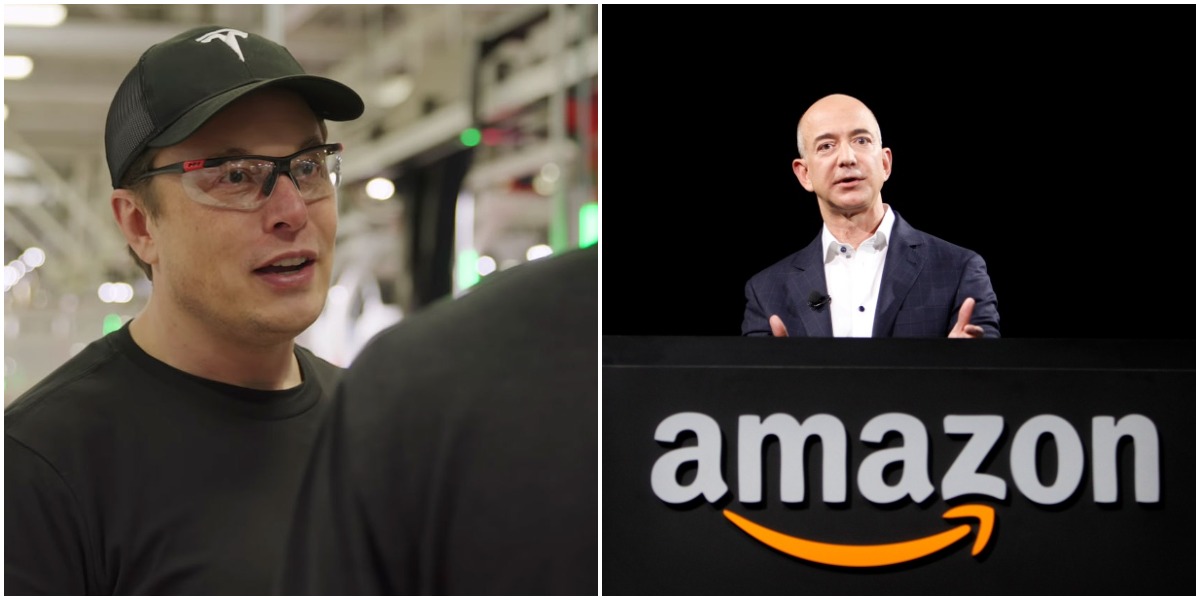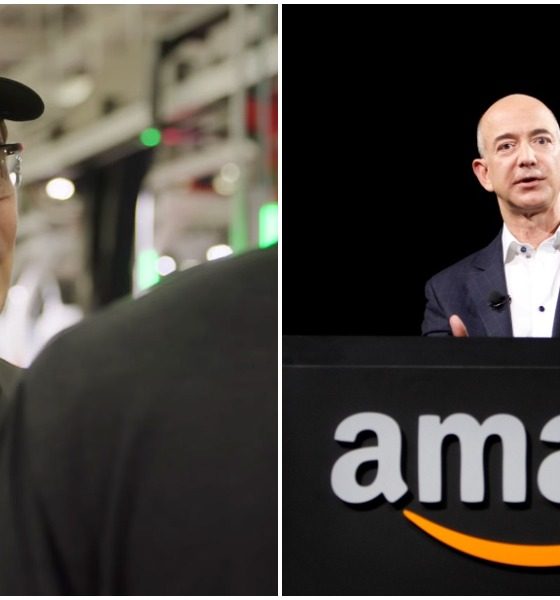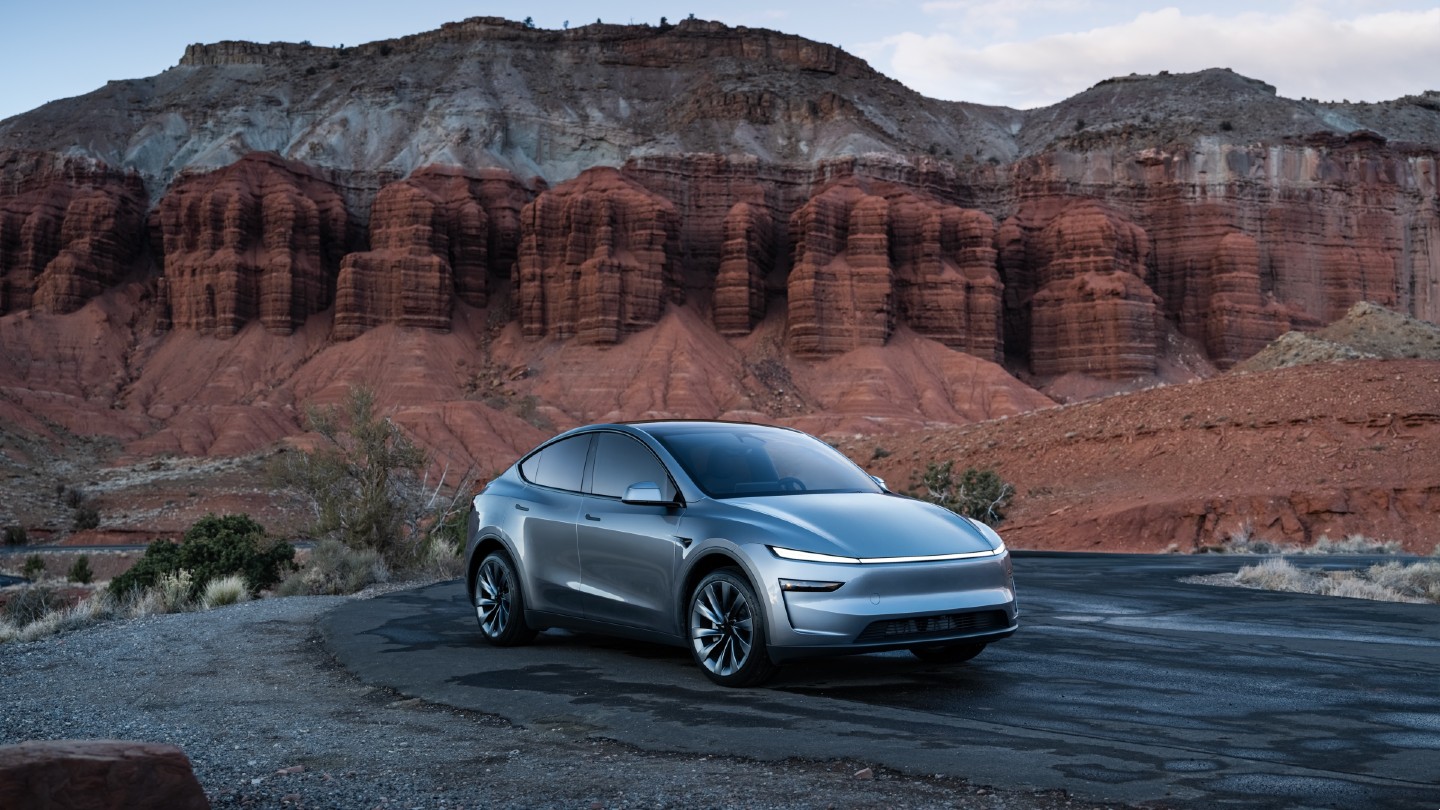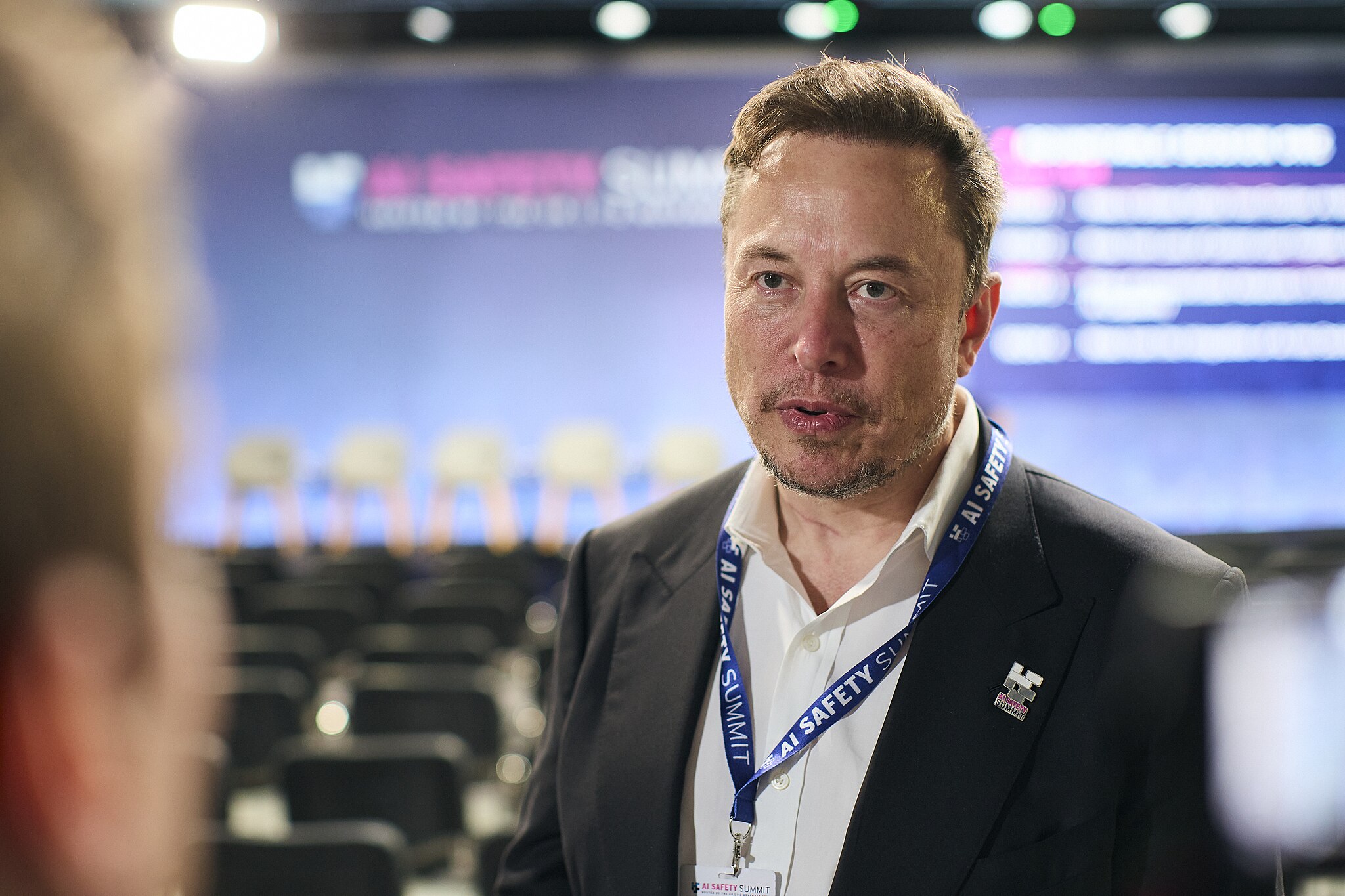

News
Jeff Bezos ponders Tesla’s ‘complexity’ in China following Musk’s Twitter acquisition
Following Elon Musk’s acquisition of social media platform Twitter yesterday, Amazon founder and former CEO Jeff Bezos pondered the potential hoops Tesla, Musk’s automotive company, may have to jump through as a company operating in China. Due to Musk’s purchase of Twitter, Bezos questioned whether China gained “a bit of leverage” over the platform’s censorship, but backtracked.
A Tweet from New York Times reporter Mike Forsythe identified Tesla’s success in the Chinese market. After entering China as an automaker in early 2020, Tesla has experienced success in the market with its Model 3 and Model Y vehicles, which have routinely been identified as a couple of the best-selling EVs in the country. Tesla’s production facility in China, known as Gigafactory Shanghai, outpaced Tesla’s U.S. factory in Fremont, California, in production figures in 2021, accounting for 51.7 percent of the company’s total vehicle deliveries for the year.
Apropos of something:
-Tesla’s second-biggest market in 2021 was China (after the US)
-Chinese battery makers are major suppliers for Tesla’s EVs.
-After 2009, when China banned Twitter, the government there had almost no leverage over the platform
-That may have just changed— Mike Forsythe 傅才德 (@PekingMike) April 25, 2022
Forsythe recognizes this, along with Chinese battery suppliers and their links to Tesla. However, his Tweet begins to also call out China’s ban of Twitter in 2009, and how the government had “almost no leverage over the platform.” With Musk’s purchase yesterday, “That may have just changed,” the Tweet concludes.
Bezos responded and jostled with the question, “Did the Chinese government just gain a bit of leverage over the town square,” using the term as Musk has in the past to compare Twitter to a social gathering of people to discuss ideas and issues. “My own answer to this question is probably not. The more likely outcome in this regard is complexity in China of Tesla, rather than censorship at Twitter.”
My own answer to this question is probably not. The more likely outcome in this regard is complexity in China for Tesla, rather than censorship at Twitter.
— Jeff Bezos (@JeffBezos) April 26, 2022
Musk, who purchased Twitter for $44 billion yesterday, said in the past his reasons for buying Twitter are related to free speech and censorship, is unlikely to see any real changes from China just because he’s bought the platform. Many American social media outlets are unavailable in China because, as the government has described in the past, it is a way to avoid “risks in the ideological field from the Internet.”
The true challenges will occur in China for Tesla; at least, Bezos thinks so. However, the automaker has had a reasonably positive relationship with China and its government, especially as Tesla has expanded operations at its plant, providing thousands of jobs to local workers.
Bezos, whose former company Amazon has done business in China for many years, purchased the Washington Post in 2013. The newspaper had no reservations about challenging Musk’s fight against censorship with stories earlier this month. Musk called the headline, “a good laugh.”
Ouch, I just snorted coffee out of my nose. pic.twitter.com/bDCYhMhdag
— Marc Andreessen (@pmarca) April 5, 2022
Additionally, a report from Dauxe Consulting reported that some 38 percent of Amazon’s top-selling brands were based in China.
Tesla has performed extremely well in China with sales, but it has also had its issues. The company had its vehicles banned from government properties and military bases due to its use of external cameras equipped for Full Self-Driving and Sentry Mode. Tesla’s in-cabin cameras are not active in China.
I’d love to hear from you! If you have any comments, concerns, or questions, please email me at joey@teslarati.com. You can also reach me on Twitter @KlenderJoey, or if you have news tips, you can email us at tips@teslarati.com.

News
Swedish unions consider police report over Tesla Megapack Supercharger
The Tesla Megapack Supercharger opened shortly before Christmas in Arlandastad, outside Stockholm.

Swedish labor unions are considering whether to file a police report related to a newly opened Tesla Megapack Supercharger near Stockholm, citing questions about how electricity is supplied to the site. The matter has also been referred to Sweden’s energy regulator.
Tesla Megapack Supercharger
The Tesla Megapack Supercharger opened shortly before Christmas in Arlandastad, outside Stockholm. Unlike traditional charging stations, the site is powered by an on-site Megapack battery rather than a direct grid connection. Typical grid connections for Tesla charging sites in Sweden have seen challenges for nearly two years due to union blockades.
Swedish labor union IF Metall has submitted a report to the Energy Market Inspectorate, asking the authority to assess whether electricity supplied to the battery system meets regulatory requirements, as noted in a report from Dagens Arbete (DA). The Tesla Megapack on the site is charged using electricity supplied by a local company, though the specific provider has not been publicly identified.
Peter Lydell, an ombudsman at IF Metall, issued a comment about the Tesla Megapack Supercharger. “The legislation states that only companies that engage in electricity trading may supply electricity to other parties. You may not supply electricity without a permit, then you are engaging in illegal electricity trading. That is why we have reported this… This is about a company that helps Tesla circumvent the conflict measures that exist. It is clear that it is troublesome and it can also have consequences,” Lydell said.
Police report under consideration
The Swedish Electricians’ Association has also examined the Tesla Megapack Supercharger and documented its power setup. As per materials submitted to the Energy Market Inspectorate, electrical cables were reportedly routed from a property located approximately 500 meters from the charging site.
Tomas Jansson, ombudsman and deputy head of negotiations at the Swedish Electricians’ Association, stated that the union was assessing whether to file a police report related to the Tesla Megapack Supercharger. He also confirmed that the electricians’ union was coordinating with IF Metall about the matter. “We have a close collaboration with IF Metall, and we are currently investigating this. We support IF Metall in their fight for fair conditions at Tesla,” Jansson said.
News
Tesla HW4.5 spotted in new Model Y, triggers speculation
Owners taking delivery of recent Model Y builds have identified components labeled “AP45.”

Tesla’s Hardware 4.5 computer appears to have surfaced in newly delivered Model Y vehicles, prompting fresh speculation about an interim upgrade ahead of the company’s upcoming AI5 chip.
Owners taking delivery of recent Model Y builds have identified components labeled “AP45,” suggesting Tesla may have quietly started rolling out revised autonomy hardware.
Hardware 4.5 appears in new Model Y units
The potential Hardware 4.5 sighting was first reported by Model Y owner @Eric5un, who shared details of a Fremont-built 2026 Model Y AWD Premium delivered this January. As per the Model Y owner, the vehicle includes a new front camera housing and a 16-inch center display, along with an Autopilot computer labeled “AP45” and part number 2261336-02-A.
The Tesla owner later explained that he confirmed the part number by briefly pulling down the upper carpet liner below the Model Y’s glovebox. Other owners soon reported similar findings. One Model Y Performance owner noted that their December build also appeared to include Hardware 4.5, while another owner of an Austin-built Model Y Performance reported spotting the same “AP45” hardware.
These sightings suggest that Tesla may already be installing revised FSD computers in its new Model Y batches, despite the company not yet making any formal announcements about Hardware 4.5.
What Hardware 4.5 could represent
Clues about Hardware 4.5 have surfaced previously in Tesla’s Electronic Parts Catalog. As reported by NotATeslaApp, the catalog has listed a component described as “CAR COMPUTER – LEFT HAND DRIVE – PROVISIONED – HARDWARE 4.5.” The component, which features the part number 2261336-S2-A, is priced at $2,300.00.
Longtime Tesla hacker @greentheonly has noted that Tesla software has contained references to a possible three-SoC architecture for some time. Previous generations of Tesla’s FSD computer, including Hardware 3 and Hardware 4, use a dual-SoC design for redundancy. A three-SoC layout could allow for higher inference throughput and improved fault tolerance.
Such an architecture could also serve as a bridge to AI5, Tesla’s next-generation autonomy chip expected to enter production later in 2026. As Tesla’s neural networks grow larger and more computationally demanding, Hardware 4.5 may provide additional headroom for vehicles built before AI5 becomes widely available.
Elon Musk
Elon Musk’s Grokipedia is getting cited by OpenAI’s ChatGPT
Some responses generated by OpenAI’s ChatGPT have recently referenced information from Grokipedia.

Some responses generated by OpenAI’s ChatGPT have recently referenced information from Grokipedia, an AI-generated encyclopedia developed by rival xAI, which was founded by Elon Musk. The citations appeared across a limited set of queries.
Reports about the matter were initially reported by The Guardian.
Grokipedia references in ChatGPT
Grokipedia launched in October as part of xAI’s effort to build an alternative to Wikipedia, which has become less centrist over the years. Unlike Wikipedia, which is moderated and edited by humans, Grokipedia is purely AI-powered, allowing it to approach topics with as little bias as possible, at least in theory. This model has also allowed Grokipedia to grow its article base quickly, with recent reports indicating that it has created over 6 million articles, more than 80% of English Wikipedia.
The Guardian reported that ChatGPT cited Grokipedia nine times across responses to more than a dozen user questions during its tests. As per the publication, the Grokipedia citations did not appear when ChatGPT was asked about high-profile or widely documented topics. Instead, Grokipedia was referenced in responses to more obscure historical or biographical claims. The pattern suggested selective use rather than broad reliance on the source, at least for now.
Broader Grokipedia use
The Guardian also noted that Grokipedia citations were not exclusive to ChatGPT. Anthropic’s AI assistant Claude reportedly showed similar references to Grokipedia in some responses, highlighting a broader issue around how large language models identify and weigh publicly available information.
In a statement to The Guardian, an OpenAI spokesperson stated that ChatGPT “aims to draw from a broad range of publicly available sources and viewpoints.” “We apply safety filters to reduce the risk of surfacing links associated with high-severity harms, and ChatGPT clearly shows which sources informed a response through citations,” the spokesperson stated.
Anthropic, for its part, did not respond to a request for comment on the matter. As for xAI, the artificial intelligence startup simply responded with a short comment that stated, “Legacy media lies.”









